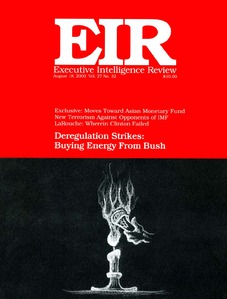Interviews
Dr. Yunjong Wang
Dr. Wang is Director of the Department of International Macroeconomics and Finance at the Korea Institute for International Economic Policy.
Departments
Editorial
Buying Electricity from Bush.
National Economy
Peru: God Offers His Challenge to Engineers
by Sara Madueño Paulet de Vásquez
A sweeping programmatic reform is not only necessary for Peru—but it is absolutely feasible, contrary to the lunatic arguments of the free-market economists who have dominated Peru’s economic and financial policy. The key is the LaRouche method of scientific physical economy. A speech by Sara Madueño de Vásquez to a Schiller Institute conference in Lima, on Dec. 28, 1999.
Economics
Asian Leaders: ‘The Days of the Washington Consensus Are Over’
by Kathy Wolfe
Government officials and advisers in South Korea, Japan, China, and the Association of Southeast Asian Nations are moving as rapidly as possible to create an Asian Monetary Fund, plus broader Asian capital markets, trading agreements, and even an Asian currency, to protect the region from a pending new global financial crisis.
‘The Crisis Is Here’
An interview with Dr. Yunjong Wang.
Billions at the Poker Table for UMTS
by Lothar Komp
The latest pipe-dream of the “New Economy” addicts is Internet surfing with mobile telephones, known as UMTS.
Sudan Sets Development Course, Despite Anglo-American Sabotage
by Muriel Mirak-Weissbach
Muriel Mirak-Weissbach reports on her findings from a recent visit to Sudan and Egypt.
Business Briefs
Feature
Fight Mounts To Reverse Electricity Deregulation
by Marsha Freeman
Residents of San Diego received electric bills in July that were more than double what they were a year ago, and all Californians are being asked to lower their electricity use, in order to avoid rolling blackouts. This disaster is a direct result of the deregulation of the electric utilities, and plenty of other states are headed for the same nightmare. The good news is, that California state legislators and others are beginning to revolt against the insane policy that they themselves voted into law.
IMF and WTO Force Worldwide Deregulation
by Marsha Freeman
Electricity Deregulation: Carter-Gore Policies, Bush Profits
by John Hoefle
Regulation: The Fight Which Saved the Nation
by Richard Freeman and Marsha Freeman
Electric power was placed under government regulation in the United States in 1935, during the Roosevelt Administration, by the Public Utility Holding Company Act. This system worked successfully for more than 60 years—until maniacal deregulators like Sens. Phil Gramm (R-Tex.) and Charles Schumer (D-N.Y.), decided to wipe it out.
Natural Gas: The Next Energy Crisis
by Marsha Freeman
International
Financial Oligarchy Goes On a Terrorist Offensive
by Elisabeth Hellenbroich
The explosion of terrorism in August is not some “sociological phenomenon,” but the result of a deliberate strategy of tension, targetting Southeast Asia, Central Asia, and Europe, especially France, Spain, and Russia.
The Cease-Fire in Kashmir Is a Step in the Right Direction
by Ramtanu Maitra
The Kashmir conflict, which erupted in 1947 and has triggered three wars between India and Pakistan, is extremely complex and cannot be resolved either arbitrarily or legalistically. It will require genuine effort by both India and Pakistan, as well international support for such an effort.
London Goes Berserk against France
by Mark Burdman
Southern Africa Slaps British on Zimbabwe
by Dean Andromidas
The Goble Project: Nasty Geopolitics in the Transcaucasus
by Hovhannes Galajian
A report from Armenia.
Taiwan’s Relations with China Improve
by Leni Rubinstein
Colombia’s ‘Demilitarized Zone’ Is a Command Center for Nazi Genocide
by Javier Almario
National
Water as a Strategic Flank: Wherein Clinton Failed
by Lyndon H. LaRouche, Jr.
Lyndon H. LaRouche, Jr. assesses the breakdown of the Camp David negotiations for Mideast peace. “President Clinton, Ehud Barak, and Yasser Arafat were sitting in a foxhole called Camp David; there they sat and talked, while the Anglo-American geopoliticians were merrily dropping political mortar-shells and hand grenades into the foxhole at leisure. Without a suitable flanking strategy, President Clinton’s efforts, whatever their merits otherwise, were doomed.”
How the Peace Was Lost Since 1993: Projects the Globalizers Would Not Allow
Gore, Bush Choose Interchangeable Veeps
by Jeffrey Steinberg
Europe Waging War vs. U.S. Death Penalty
by Marianna Wertz
‘Politics of Personal Destruction’ Began in Bush’s ’92 Campaign
by Edward Spannaus
National News



